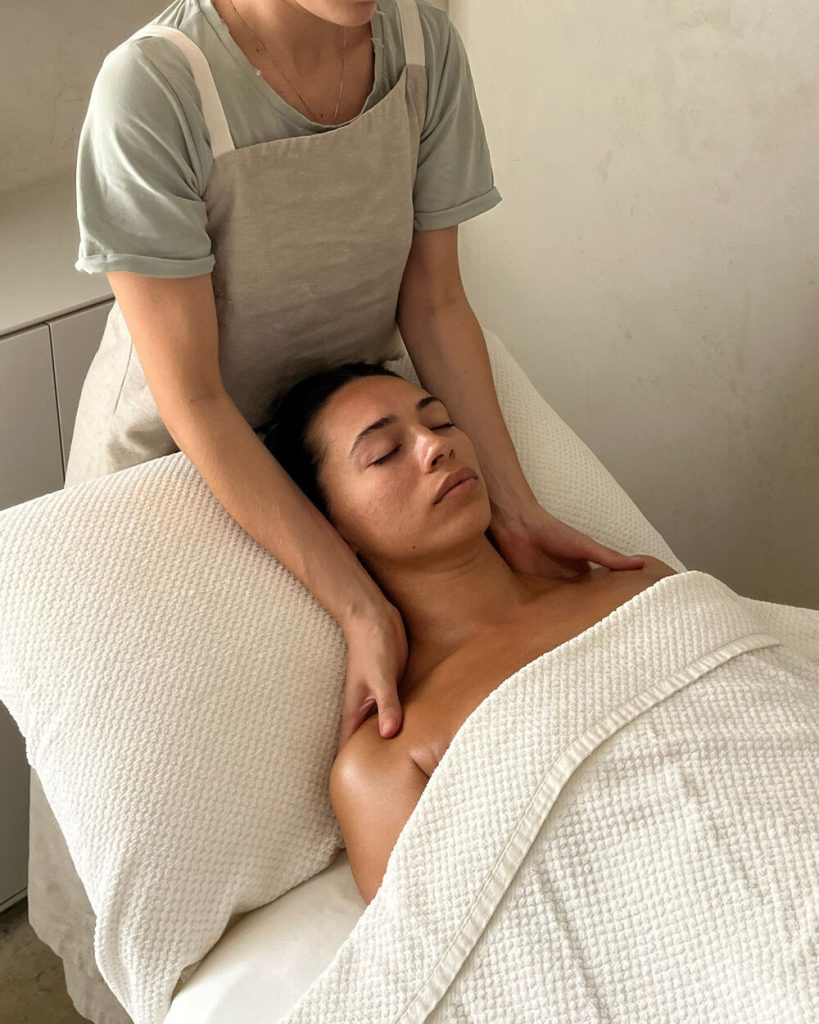Sometimes, the energy of everyday life can feel overwhelming, and you might feel a sense of being pulled in too many directions. In those moments, it’s essential to have your own inner sanctuary—a set of tools or practices that help you stay grounded and balanced, even when life feels demanding. This is self-care.
Like the ebb and flow of a busy day, life throws unexpected challenges. Stress and overwhelm can easily disrupt your equilibrium. Self-care, however, provides a steady foundation and helps you navigate the complexities of life.
And here’s the beautiful thing: the more secure your inner foundation is, the more effectively you can support others. If you’re struggling to maintain your own balance, it’s difficult to extend a helping hand. But by prioritising your own wellbeing, you become a stronger and more reliable source of support for those you love.
Everyone deserves to experience wellbeing. Self-care is an act of love for yourself and for those around you. When you care for yourself, you’re better equipped to nurture your relationships and show up as your best self.
This blog post will explore the importance of self-care and provide practical tips for incorporating it into your daily life. We’ll cover different aspects of self-care—physical, emotional, mental, spiritual, and professional—and offer guidance on creating a self-care routine that works for you.

Sometimes, the energy of everyday life can feel overwhelming, and you might feel a sense of being pulled in too many directions. In those moments, it’s essential to have your own inner sanctuary—a set of tools or practices that help you stay grounded and balanced, even when life feels demanding. This is self-care.
Like the ebb and flow of a busy day, life throws unexpected challenges. Stress and overwhelm can easily disrupt your equilibrium. Self-care, however, provides a steady foundation and helps you navigate the complexities of life.

And here’s the beautiful thing: the more secure your inner foundation is, the more effectively you can support others. If you’re struggling to maintain your own balance, it’s difficult to extend a helping hand. But by prioritising your own wellbeing, you become a stronger and more reliable source of support for those you love.
Everyone deserves to experience wellbeing. Self-care is an act of love for yourself and for those around you. When you care for yourself, you’re better equipped to nurture your relationships and show up as your best self.
This blog post will explore the importance of self-care and provide practical tips for incorporating it into your daily life. We’ll cover different aspects of self-care—physical, emotional, mental, spiritual, and professional—and offer guidance on creating a self-care routine that works for you.
our mission
At endota, we challenge the notion that prioritising yourself is selfish because self-love, even in small daily doses, is integral to overall wellbeing. We understand that when you thrive, you’re better equipped to contribute positively to the world around you.
This ethos recognises that prioritising your wellbeing is about creating a ripple effect of positivity.
what is self-care?
At endota, we challenge the notion that prioritising yourself is selfish because self-love, even in small daily doses, is integral to overall wellbeing. We understand that when you thrive, you’re better equipped to contribute positively to the world around you.
This ethos recognises that prioritising your wellbeing is about creating a ripple effect of positivity.

importance of self-care
Self-care is essential for several reasons. It can help to:
- Reduce stress and anxiety
- Improve your mood
- Boost your energy levels
- Strengthen your immune system
- Improve your sleep quality
- Increase your focus and concentration
- Improve your relationships
- Increase your productivity
- Live a more fulfilling life.
When you neglect self-care, it can take a toll on your physical and mental health. You could experience fatigue, headaches, muscle tension, irritability, and difficulty concentrating.
importance of self-care

Self-care is essential for several reasons. It can help to:
- Reduce stress and anxiety
- Improve your mood
- Boost your energy levels
- Strengthen your immune system
- Improve your sleep quality
- Increase your focus and concentration
- Improve your relationships
- Increase your productivity
- Live a more fulfilling life.
When you neglect self-care, it can take a toll on your physical and mental health. You could experience fatigue, headaches, muscle tension, irritability, and difficulty concentrating.
making yourself a priority
Making yourself a priority is not selfish—it’s essential. You must first tend to your own inner sanctuary before you can provide support to those around you.
Here are a few tips for making yourself a priority:
- Set boundaries. It’s okay to say no to things that will drain your energy or time.
- Delegate tasks. Don’t try to do everything yourself. Ask for help from friends, family, or colleagues.
- Schedule time for self-care. Like you would schedule an appointment with a doctor or dentist, schedule time for activities that nourish you.
physical self-care
Physical self-care is foundational to your overall wellbeing. It’s about nurturing your body through mindful practices. Here are a few tips for physical self-care:
- Nourish your body: Choose a balanced diet of fruits, vegetables, lean protein, and whole grains.
- Prioritise sleep: Aim for 7-8 hours of quality sleep each night to allow your body to recover and rejuvenate.
- Move your body: Engage in at least 30 minutes of moderate-intensity exercise most days of the week.
- Stay hydrated: Drink plenty of water throughout the day to support your body’s functions.
- Schedule regular checkups: Stay proactive about your health with routine appointments with your doctor.
- Incorporate massage: Consider incorporating regular massage into your routine. Studies conducted with the endota Organic Relax Massage showed a reduction in heart rate and perceived stress in participants. This supports the concept that incorporating massage into your routine can be an effective tool for stress management and physical wellbeing.
- Nurture your skin: Establish a consistent skincare routine to suit your skin’s unique needs. This includes cleansing, moisturising, and protecting your skin from the sun. Using quality products that align with your skin type supports long-term skin health and contributes to your overall sense of wellbeing.
emotional self-care
Emotional self-care is about taking care of your feelings and mental health. This includes finding healthy ways to manage stress and emotions, and setting healthy boundaries.
Here are a few tips for emotional self-care:
- Practice relaxation techniques such as yoga, meditation, or deep breathing.
- Spend time in nature.
- Connect with loved ones.
- Do things that make you happy.
- Seek professional help if you’re experiencing heightened feelings of stress or anxiety.

psychological self-care
Psychological self-care is about taking care of your mind. This includes challenging negative thoughts, developing a growth mindset, and setting goals.
Here are a few tips for psychological self-care:
- Practise positive affirmations: Begin your day with positive affirmations. Remind yourself of your strengths and potential. A simple “I am capable” or “I choose to feel calm” can shift your mindset.
- Challenge negative thoughts: When negative thoughts arise, question their validity. Replace them with more balanced and realistic perspectives.
- Develop a growth mindset: Embrace challenges as opportunities for learning and growth. Believe that your abilities can be developed through dedication and hard work.
- Set goals and track your progress: Establish achievable goals and celebrate your progress along the way.
- Learn something new: Engage in activities that stimulate your mind, such as reading, learning a new skill, or exploring new hobbies.
- Journal your thoughts: Set aside time for journaling. Writing down your thoughts and feelings can provide clarity, reduce stress, and promote self-reflection. Explore gratitude journaling, or simply write about your day.

psychological self-care
Psychological self-care is about taking care of your mind. This includes challenging negative thoughts, developing a growth mindset, and setting goals.
Here are a few tips for psychological self-care:
- Practise positive affirmations: Begin your day with positive affirmations. Remind yourself of your strengths and potential. A simple “I am capable” or “I choose to feel calm” can shift your mindset.
- Challenge negative thoughts: When negative thoughts arise, question their validity. Replace them with more balanced and realistic perspectives.
- Develop a growth mindset: Embrace challenges as opportunities for learning and growth. Believe that your abilities can be developed through dedication and hard work.
- Set goals and track your progress: Establish achievable goals and celebrate your progress along the way.
- Learn something new: Engage in activities that stimulate your mind, such as reading, learning a new skill, or exploring new hobbies.
- Journal your thoughts: Set aside time for journaling. Writing down your thoughts and feelings can provide clarity, reduce stress, and promote self-reflection. Explore gratitude journaling, or simply write about your day.
spiritual self-care
Spiritual self-care is about connecting with something larger than yourself. This could involve spending time in nature, practising religion or spirituality, engaging in creative pursuits, or simply taking time for reflection and introspection.
Here are a few tips for spiritual self-care:
- Spend time in nature by going for a walk in the park, earthing, taking a long hike, or simply sitting outside and enjoying the fresh air.
- Practice mindfulness and pay attention to the present moment without judgment.
- Connect with your values by spending time reflecting on what matters to you and how you can live a life that aligns with those values.
- Whether painting, writing, playing music, or gardening, creative activities can be a great way to connect with your inner self.
- Practice gratitude and take time each day to appreciate the good things in your life.
professional self-care
Professional self-care is about taking care of yourself at work. This includes setting boundaries, managing your workload, and taking daily breaks.
Here are a few tips for professional self-care:
- Set boundaries by learning to say no to things that will drain your energy or time.
- Take breaks throughout your day to step away from your desk for a few minutes to stretch, get some fresh air, or close your eyes and take a few deep breaths.
- Manage your workload by prioritising your tasks and breaking them down into smaller, more manageable chunks.
- Connect with your colleagues and build positive relationships with your coworkers.
- Find a mentor or coach who can provide you with support and guidance as you navigate your career.

professional self-care
Professional self-care is about taking care of yourself at work. This includes setting boundaries, managing your workload, and taking daily breaks.
Here are a few tips for professional self-care:

- Set boundaries by learning to say no to things that will drain your energy or time.
- Take breaks throughout your day to step away from your desk for a few minutes to stretch, get some fresh air, or close your eyes and take a few deep breaths.
- Manage your workload by prioritising your tasks and breaking them down into smaller, more manageable chunks.
- Connect with your colleagues and build positive relationships with your coworkers.
- Find a mentor or coach who can provide you with support and guidance as you navigate your career.
at-home self-care
Creating a calming environment at home can enhance relaxation and promote overall wellbeing. Here are some ways to incorporate self-care into your home routine:
- Soak away tension in a warm bath infused with the restorative ingredients of our Signature Blend Bubble Bath. The warm water helps to soothe sore muscles, while muscle-relaxing ingredients such as magnesium and chamomile help dissolve unwanted tension from your body.
- Enjoy the many benefits of aromatherapy – we recommend having our Signature Blend Reed Diffuser or Soy Candle in your space to bring more calm.
- Rejuvenate your complexion with the Power Serum Sheet Mask, Instant Revival Power Mask, or Brightening Hydrogel Eye Mask for a relaxing experience.
- Soothe tired feet with the Nourishing Foot Mask or a foot massage using the Signature Blend Body & Massage Oil and Foot Massage Tool.
- Set aside time for some dry body brushing, then apply the Signature Blend Body & Massage Oil for smooth, hydrated skin.

in-spa self-care
Sometimes, the best way to recharge is to step away from daily responsibilities and immerse yourself in a rejuvenating spa experience. Treatments designed to relax and restore can make a lasting difference to your wellbeing.
Book a treatment at endota:
- Organic Relax Massage: Unwind and feel the benefits of a full-body massage that calms your body and mind. Healing jade stones work into your back and legs to further relax these common tension areas.
- Customised Facial: Your therapist will curate the skincare formulations used in this treatment to target your skin concerns. Finished with a soothing foot and scalp massage, this treatment balances and relaxes holistically.
- Rejuvenate Spa Package: Begin with a foot soak, followed by a revitalising full-body exfoliation, a warm oil cocoon, and a soothing massage. A nourishing facial, moisture-rich mask, and scalp massage complete the experience, leaving you feeling refreshed and restored from head to toe.
Make a beautiful commitment to yourself and experience the cumulative benefits of our Treatment Series. Purchase four of the same treatment and receive a bonus fifth treatment. This allows you to consistently enrich the health and radiance of your skin and revitalise your body and mind.

in-spa self-care
Sometimes, the best way to recharge is to step away from daily responsibilities and immerse yourself in a rejuvenating spa experience. Treatments designed to relax and restore can make a lasting difference to your wellbeing.
Book a treatment at endota:
- Organic Relax Massage: Unwind and feel the benefits of a full-body massage that calms your body and mind. Healing jade stones work into your back and legs to further relax these common tension areas.
- Customised Facial: Your therapist will curate the skincare formulations used in this treatment to target your skin concerns. Finished with a soothing foot and scalp massage, this treatment balances and relaxes holistically.
- Rejuvenate Spa Package: Begin with a foot soak, followed by a revitalising full-body exfoliation, a warm oil cocoon, and a soothing massage. A nourishing facial, moisture-rich mask, and scalp massage complete the experience, leaving you feeling refreshed and restored from head to toe.
Make a beautiful commitment to yourself and experience the cumulative benefits of our Treatment Series. Purchase four of the same treatment and receive a bonus fifth treatment. This allows you to consistently enrich the health and radiance of your skin and revitalise your body and mind.
on-the-go self-care
Self-care doesn’t have to be confined to your home or the spa. Incorporate small but effective rituals into your day:
- Use a Gua Sha Facial Tool or Jade Roller with our Vitamin Treatment Oil or Phyto-Renewal Oil for a quick facial massage to relieve tension.
- Carry a Signature Blend Hand Therapy tube to keep your hands hydrated throughout the day. The functional scents of bergamot and ylang ylang incorporate aromatics and touch to instil calm into your day.
- Pack a pair of the Brightening Hydrogel Eye Masks for a quick refresh before an important event.
- Keep our De-Stress Roll-On in your bag for when you need to centre the mind and body on the move.
creating a self-care routine
Creating a self-care routine is an effective way to make sure that you’re taking care of yourself regularly. Start by identifying a few self-care activities that you enjoy and that you can realistically incorporate into your daily or weekly schedule.
Here are a few tips for creating a self-care routine:
- Start small: Don’t try to do too much at once. Start with one or two small changes and gradually add more as you go.
- Make it enjoyable: Choose activities that you enjoy.
- Be consistent: Make self-care a regular part of your routine.
- Be patient: It may take some time to develop a self-care routine that works for you.
put yourself first
Self-care is not a one-size-fits-all solution. It’s about finding what works best for you and prioritising it. The more you prioritise your wellbeing, the stronger and more resilient you become—not just for yourself, but for those around you.
Discover our range of products designed to nourish your mind, body, and spirit. You can also experience the power of touch at your local endota spa.
¹Source: https://www.sciencedirect.com/topics/psychology/self-care
²Source: https://endotaspa.com.au/media/wysiwyg/blogs/dr-hayley/massage-research/Dr_Hayley_Research_Paper_-_Massage.pdf

